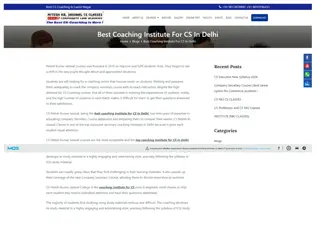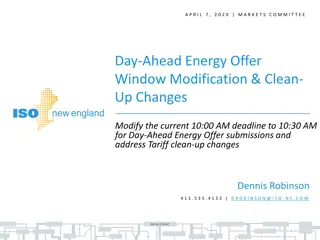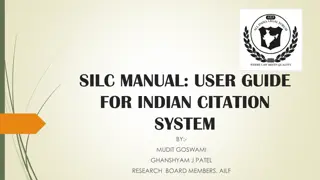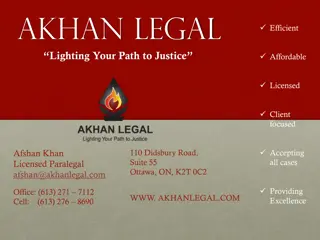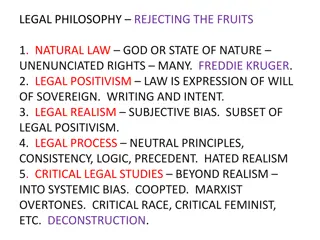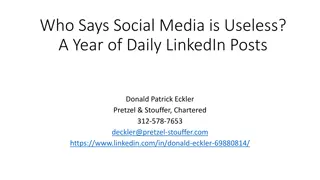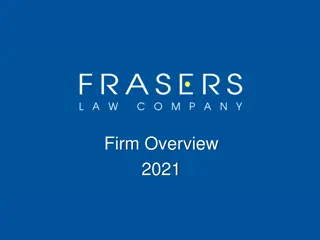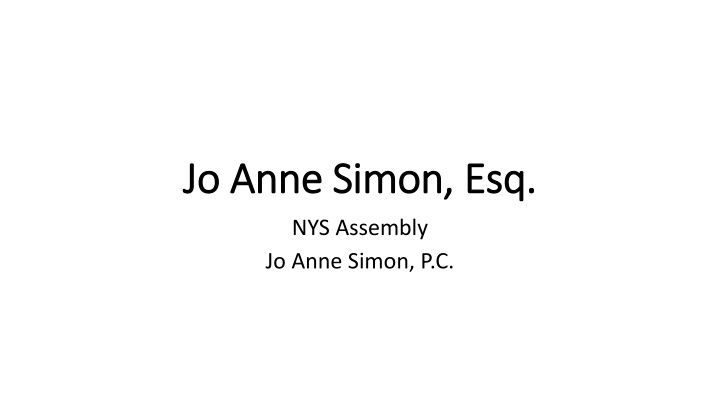
Collateral Impacts of COVID-19 on Developing Case Law and Beyond
Explore the collateral impacts of COVID-19 on developing case law, disability intersectionality, economic challenges, and more. Discover how the pandemic has influenced standardized testing, internships, mental health, and the overall economy. Dive into discussions on rental subsidies, job loss, health insurance, and legal rights amidst challenging times.
Download Presentation

Please find below an Image/Link to download the presentation.
The content on the website is provided AS IS for your information and personal use only. It may not be sold, licensed, or shared on other websites without obtaining consent from the author. If you encounter any issues during the download, it is possible that the publisher has removed the file from their server.
You are allowed to download the files provided on this website for personal or commercial use, subject to the condition that they are used lawfully. All files are the property of their respective owners.
The content on the website is provided AS IS for your information and personal use only. It may not be sold, licensed, or shared on other websites without obtaining consent from the author.
E N D
Presentation Transcript
Jo Anne Simon, Esq. Jo Anne Simon, Esq. NYS Assembly Jo Anne Simon, P.C.
A few Updates to 2020 presentation COVID-19 collateral impacts and effects on developing case law Who has a disability updating Berger and Ramsay + new cases
A few trends some troubling, some not Intersectionality of disability, gender, race/bodily autonomy Perceived as having a disability Essential functions Availability of damages Internet as place of public accommodation
Collateral impacts of Covid of Covid- -19 19 1) Remote administration of standardized tests and wider implications w/in postsecondary education Paul discussed 2) Work study and on campus jobs 3) Local hiring in college towns without students many local businesses- especially bars and restaurants will have closed. Will they reopen? 4) Fewer internships many are becoming available, but as offices continue to work remotely (even if Part-time), their ability to safely incorporate interns may change, especially as COVID variants spread. Think schools, medical facilities, event spaces 5) Impacts on mental health will be pervasive.
Collateral impacts of Covid of Covid- -19, cont d 19, cont d 6) The market is going up but overall economic impacts remain problematic. Primary impacts: - jobs data is promising, but too many people have lost their livelihoods and Delta variant threatens recovery because of polititization of vaccines - rent federal money to the states allow for rent and mortgage subsidies, but how do you pay rent if your work is shut down or scaled back? State Unemployment Insurance systems not glitch-free. - food insecurity remains profound; - health insurance 4.5 million Americans lost health insurance because they lost their jobs.. Will this drive the passage of medicare for all?
Trouble ahead Trouble ahead Section 504 and the Civil Section 504 and the Civil Rights Rights Rights Rights Restoration Act Restoration Act TW v NYBOLE BOLE stopped accepting vouchers to cover exam fee. These has been processed via vouchers for clients of Voc Rehab and Commission for the Blind. Nevertheless, the fee paid by the applicant with a disability was reimbursed by the agency using federal funds. Thus, federal monies did go to the BOLE, but through the applicant, not a state agency. 2d Circuit held that BOLE was part of courts of original jurisdiction, so whatever money came into the Unified Court System, if it didn t go to the lower courts, too bad, so sad. Thus, anyone discriminated against by a sub-entity of the judicial branch is out of luck when it comes to compensatory damages, unless it is under one of the appellate courts and they don t have such sub-entities. This permits evasion of responsibilities under CRRA protected civil rights acts Title VI, Title IX, Age Discrimination Act, Section 504 so race, sex, age and disability.
Cummings v. Premier Rehab Keller Cummings v. Premier Rehab Keller Jane Cummings = deaf woman who is also legally blind. She sought physical therapy for back pain and requested Premier Rehab provide an ASL interpreter. Premier refused and suggested she use written notes, lipreading and gesturing. She went to another provider but, unhappy with their services and again sought PT at Premier, which again refused to hire an interpreter and was again refused. She brought suit seeking damages for physical and emotional distress. The court dismissed her claims for damages under the Rehab Act and the Affordable Care Act (ACA). The 5thCircuit affirmed, holding that compensatory damages were available, but not for emotional distress.
The Supreme Court just granted Certiorari The Supreme Court just granted Certiorari QUESTION PRESENTED: Title VI of the Civil Rights Act of 1964 prohibits recipients of federal funds from discriminating based on race. Congress has expressly incorporated Title VI s remedies for victims of discrimination into other anti- discrimination laws, including the Rehabilitation Act, 29 U.S.C. 794a(a)(2), and the Affordable Care Act, 42 U.S.C. 18116(a). Those remedies include a right to recover compensatory damages. Barnes v. Gorman, 536 U.S. 181, 187 (2002). The question presented is: Whether the compensatory damages available under Title VI and the statutes that incorporate its remedies include compensation for emotional distress.
Supreme Court also granted Certiorari in Supreme Court also granted Certiorari in CVS v. Doe CVS v. Doe From the Cert petition: QUESTIONS PRESENTED. Section 1557 of the Patient Protection and Affordable Care Act ( ACA ) creates a private right of action for discrimination on the basis of race, sex, age, and disability in federally funded health programs and activities. 42 U.S.C. 18116(a). This private right of action incorporates the enforcement mechanisms of other federal antidiscrimination statutes, including the Rehabilitation Act of 1973, 29 U.S.C. 794, which prohibits disability discrimination. The question upon which the Court granted cert is: Whether section 504 of the Rehabilitation Act, and by extension the ACA, provides a disparate-impact cause of action for plaintiffs alleging disability discrimination.
Disability, competence, bodily autonomy #FreeBrittany The history of disability discrimination has a long and often sordid past. From the institutions where those with mental illness were imprisoned to the notorious case of Buck v. Bell at the height of the eugenics movement in the United States. Carrie Buck was sterilized by the state of Virginia in 1927 because as Supreme Court Justice Oliver Wendall Holmes decreed, three generations of imbeciles is enough. Apparently having been born out of wedlock and then being impregnated by her rapist and delivering her child out of wedlock made her and her daughter feebleminded (her daughter made the honor roll before her untimely death from a childhood disease). Today states aren t forcibly sterilizing people for being feebleminded, but they are approving conservatorships giving total control over a person s every decision, including the decision to have a child, often without counsel protecting the subject of the conservatorship - like Brittany Spears - in violation of her most fundamental rights to due process, bodily autonomy and procreation. The intersectionality of gender and disability/perceived disability is enormous. No guardianship for Robert Downey, Jr., Justin Bieber, Shia LeBoef or the long list of male childhood stars who melted down on drugs and alcohol. But Judy Garland was kept on pills to keep her compliant and thin, and vulnerable to a series of personal managers (men) who bled her dry.
We see these guardianships among postsecondary students with autism and intellectual disabilities, which are provided with little due process and the biggest offenders are the parents, who are naturally fearful for their child s safety and less than concerned about their due process rights. Treatment instrusiveness and control over the lives of PWDs, especially those with mental illness DOE v. Supreme Court of Kentucky, 482 F.Supp.571 (WD Ky. 2020)
Attendance as Essential Function Attendance as Essential Function Vande Zande v. Wisconsin Hostettler v. College of Wooster Bilinsky v. American Airlines Peeples v. Clinical Support Options Silver v. City of Alexandria (98 year old city councilman needed remote access to attend city council meetings during COVID. Creepezoid Speaker said no, sorry, we can t do that (na na na na na). Court said oh yes, you will.
Website as place of public accommodation Website as place of public accommodation Gil v. Winn Dixie Blind plaintiff unsuccessfully sued and lost Winn Dixie s website is not a public accommodation. Gil had tried to refill a prescription using a computer. Not accessible. Gil is the first federal appeals court(11th Circuit) decision saying that websites aren t subject to the ADA Robles v. Domino s Pizza beating back various specious arguments, the court rules that Domino s must make it s website and mobile app fully accessible. Favorite line from the decision: In finding that telephone access was insufficient, the court said, No person who has ever waited on hold with customer service or ever been hungry for a pizza would find this to be an acceptable substitute for ordering from a website.
The perennial issue: Who has a Disability? Update on two Cases Against the NBME Demonstrating its Failure to Implement Condition, Manner, or Duration Analyses Berger v. Nat l Bd. of Med. Examiners, No. 1:19-CV-99, 2019 WL 4040576 (S.D. Ohio Aug. 27, 2019), appeal to the 6thCir. filed (September 19, 2019) Ramsay v. Nat l Bd. of Med. Examiners, No. 19-CV-2002, 2019 WL 7372508 (E.D. Pa. Dec. 31, 2019), appeal to the 3rdCir. filed (January 9, 2020)
Restoration of the ADA (and Section 504) by Congress Restoration of the ADA (and Section 504) by Congress by Reconstruction of the Definition of Disability by Reconstruction of the Definition of Disability Americans with Disabilities Act of 1990 [ADA], 42 U.S.C. 12101 Effective July 26, 1990 https://www.ada.gov/pubs/ada.htm Americans with Disabilities Act, Amendments Act of 2008 (ADAAA)=ADA, as amended Effective January 1, 2009 https://www.eeoc.gov/laws/statutes/adaaa.cfm EEOC was authorized to write the Regulations implementing (who has a disability) under the ADAAA 29 CFR Part 1630 [employment] Effective September 15, 2011, published in the Federal Register on March, 25, 2011 http://www.eeoc.gov/laws/statutes/adaaa_info.cfm; https://www.gpo.gov/fdsys/pkg/FR-2011-03-25/pdf/2011-6056.pdf DOJ, Title II & III Regulations and Guidance implementing the ADAAA, focusing on the testing and higher education industries 28 CFR Parts 35 & 36 [testing and higher education] Effective October/11/2016, published in the Federal Register on August 11, 2016 https://www.federalregister.gov/documents/2016/08/11/2016-17417/amendment- of-americans-with-disabilities-act-title-ii-and-title-iii-regulations-to-implement-ada Most important guidance for DSS providers
For Higher Education, An Important Example in the EEOC Regulations Implementing the ADAAA An impairment may substantially limit the condition or manner or duration under which a major life activity can be performed in a number of ways. the condition or manner under which a major life activity can be performed may refer to the way an individual performs a major life activity. Condition or manner may also describe how performance of a major life activity affects the individual with an impairment. condition or manner may refer to the extent to which a major life activity can be performed. Condition, manner, or duration may also suggest the amount of time or effort an individual has to expend when performing a major life activity because of the effects of an impairment, even if the individual is able to achieve the same or similar result as someone without the impairment.
DOJ 2016 DOJ 2016 Regulations implementing the ADAAA Regulations implementing the ADAAA with Regard to Title II and Title III of the ADA and DOJ Analysis with Regard to Title II and Title III of the ADA and DOJ Analysis http://federalregister.gov/a/2016-17417 The purpose of these new regulations was to explicitly ensure that the ADAAA definition of disability is implemented in entities covered by Titles II and III with regard to all claims of disability The focus is on two entities , higher education and the standardized testing industry and on two kinds of impairments, learning disabilities (including Dyslexia) and ADHD. Post-COVID will be applied to sequelae, incl brain fog
2016 DOJ Rules and Guidance Pertinent to the Case 2016 DOJ Rules and Guidance Pertinent to the Case Study Plaintiffs, Study Plaintiffs, Berger Berger and and Ramsay Ramsay (2) (2) Analysis should emphasize consideration of limits rather than outcomes For example, someone with a learning disability may achieve a high level of academic success, but may nevertheless be substantially limited in one or more of the major life activities of reading, writing, speaking, or learning because of the additional time or effort he or she must spend to read, speak, write, or learn compared to most people in the general population During the public comment period, prior to issuance of the final version this regulation, it was opposed in the written comments prepared by counsel for the NMBE. Moral of the story: know who your friends are - and aren t!
Berger and Ramsay Shared Many Challenges Both Brendan Berger and Jessica Ramsay were medical students who had to pass all three Steps of the USMLE (United States Medical Licensing Exam) in order to become practicing physicians The USMLE is developed and administered by the NBME (the National Board of Medical Examiners) Berger and Ramsay were denied accommodations on the USMLE, including requests for extra time, breaks, and a low distraction testing environment
Berger & Ramsay Berger & Ramsay - - additional shared challenges additional shared challenges Both had strong academic records, and without accommodations, had done as well as most people in the general population on some demanding high stakes standardized exams such as the MCAT and, in Berger s case, a passing grade on Step 1 of the USMLE Both received informal and formal accommodations in high school, college and formal accommodations throughout medical school Both provided the NBME extensive expert-prepared objective, observational, and self-narrative documentation supporting that, despite high IQs, they are substantially limited with regard to reading, writing, and mathematical fluency (below the 10thpercentile), as well as with regard to concentration Their performance is substantially improved on a standardized reading achievement test when he/she received extra time to complete the test
Why seek preliminary Injunctions? Why seek preliminary Injunctions? There are three Step exams. Without passing all USMLE Step Exams neither Berger nor Ramsay would become a doctor Another realistic concern: even if they could pass the Step Exams without accommodations, their scores would be so low as to preclude desirable residency placements Cases were decided under Title III of the ADA, in different federal district courts.
Following Similar Reasoning, Both Federal District Courts Following Similar Reasoning, Both Federal District Courts Grant the Requested Preliminary Injunctions Grant the Requested Preliminary Injunctions (1) (1) The NBME s review standards are not consistent with several provisions of the ADAAA as implemented through DOJ regulations and guidance [A]lthough NBME may not have liked the terminology used in the implementing regulations, despite its registered objections, the foregoing language is what was enacted and it is this language which must be followed in assessing accommodations requests under the ADA. It [the NBME] decidedly did not do so in this case. Ramsay at 17. Without any persuasive reason, and contrary to DOJ guidance, the NMBE granted greater weight to the judgment and conclusions of its own experts, who had never met with either Plaintiff, than those experts who had observed them directly Both Plaintiffs were evaluated by qualified experts Both Plaintiffs were evaluated with a variety of instruments The reports submitted by both Plaintiffs were prepared following direct observation not just of outcomes, including observed self-accommodative practices, including ones that bear on fluency or the condition, manner, or duration of test-taking
Following Similar Reasoning, Both Federal District Courts Following Similar Reasoning, Both Federal District Courts Grant the Requested Preliminary Injunctions Grant the Requested Preliminary Injunctions (2) (2) As to both Plaintiffs, the NMBE followed a bottom line/outcome based analysis rather than a condition, manner or duration analysis: [The] NBME either discounted or disregarded entirely the admonition to focus on how a major life activity is substantially limited, and not on what outcomes an individual can achieve and apparently ignored the example that someone with a learning disability may achieve a high level of academic success, but may nevertheless be substantially limited in the major life activity of learning because of the additional time or effort he or she must spend to read, write, or learn compared to most people in the general population. 29 C.F.R. 1630.2(j)(4)(iii). NBME s exclusive focus on Plaintiff s prior academic successes and her performance on the ACT and MCAT standardized examinations without accommodations was therefore improper . Ramsay at 18. [T]he Court also recognizes that [a] definition of disability based on outcomes alone, particularly in the context of learning disabilities, would prevent a court from finding a disability in the case of any individual . . . who is extremely bright and hardworking, and who uses alternative routes to achieve academic success," a result that would be inconsistent with the goals of the ADA. Bartlett v. New York State Bd. of Law Examiners Berger at 45. The inability of Berger to finish exams, ones for which he had prepared to an exceptional degree, should have been given considerable weight as appropriate to a condition or manner or duration analysis. Berger at 29-30 and 46-47.
Though neither student received a formal diagnosis of a disability prior to high school, both had extensive histories of informal and formal accommodations, including in medical school; their histories were given little weight by the NBME: [W]e also find that Defendant ran afoul of 28 C.F.R. 36.309(b)(v) which requires that [w]hen considering requests for ... accommodations ... the [testing]entity give[ ]considerable weight to documentation of past modifications, accommodations, or auxiliary aids or services received in similar testing situations ... Again, it does not appear from the record that NBME gave any consideration, much less the considerable weight required to Ms. Ramsay s past record of having received accommodations. Ramsay at 18.
What did the testing companies object to in these cases? the primary objective of the ADA should be on whether entities have complained and not whether the individual has a disability Determining whether an individual has a disability should not demand extensive analysis substantially limits is not meant to be a demanding standard Inclusion of in the rules of examples like self mitigating measures or undocumented modifications or accommodations for students that affect learning, reading or concentrating might include devoting a larger portion of the day, weekends or holidays to study than students without disabilities. BUT argued for a new regulation that mitigating measure should be considered in analyzing whether accommodations were needed.
In other words. In other words . They objected to the ADA Amendments Act! Because they had objected to these very same points in 2008 and again in 2012, it was clear they knew the law. They just didn t like it. The court said: Indeed, although NBME may not have liked the terminology used in the implementing regulations, despite its registered objections, the foregoing language is what was enacted and it is this language which must be followed in assessing accommodations requests under the ADA. It decidedly did not do so in this case.
The NMBE Appealed both Decisions The NMBE Appealed both Decisions Berger - Oral argument was scheduled for August 2020.Berger subsequently settled with the NBME. Thus, there is no appellate decision. Ramsay - Oral argument was July 1, 2020. Third Circuit affirmed on July 30, 2020. 27
Who has a disability (contd)? Cohen v. Integrated Project Delivery Partners associational discrimination: elderly sick parents who needed care (cancer and MS). Fired after taking days off during Christmas holiday (she says it was approved) Defendants moved for summary judgment. To succeed, Def must show that no genuine issue of material fact exists. Court denied there are factual disputes to be determined at trial.
Champion v. Mannington Mills Champion v. Mannington Mills E E runs into her brother in parking lot where they both work. They chat about 4 minutes and stand apart. Later that day, brother feels sick and is sent to ER and tested for COVID, which 4 days later comes back positive E R asks Champion is she was near her brother at work or outside. She forgets the parking lot conversation and says no. BUT co-workers have seen her and report it. She is sent home from work and later fired. Sues for associational discrimination alleges brother is a PWD because he has COVID
Her suit alleges COVID is a disability and specifically alleges: that Mannington did not investigate whether any of the other employees had close contact with Evans; they only investigated her because she was related to him. that she was the only employee accused of dishonesty upon initially forgetting about her encounter in the parking lot. that of all the employees who had contact with her brother, she was the only one not permitted to work from home, take paid leave while in quarantine, or continue working on-site even at higher rates of pay, and was the only employee made to feel "diseased" and "discarded."
Champion does not allege in how COVID substantially limited any of her brother s major life activities. (COVID can substantially limit ) She alleged he was substantially limited in communications because he couldn t speak with anyone in person. The Court: The Court has little trouble disagreeing with Champion's legally-flawed position that anyone alleged to have COVID-19 is "disabled" as that term is defined by the ADA. Court found in person communication is not a major life activity. So the first is COVID a disability? case fails one must analyze each case individually.
Eshleman v. Patrick Industries Eshleman v. Patrick Industries Plaintiff took 2 months medical leave to have a lung biopsy and after returning to work, later took two vacation days for an upper respiratory infection. Employer fired him for shifting reasons. Plaintiff alleged he was regarded as disabled. District Court granted E R s motion finding that the impairment was transitory and minor, thus Eshleman did not have a disability under the ADA. Third Circuit reversed and remanded Impairment was transitory, but not necessarily minor that is a question of fact for the trier of fact. District court failed to consider whether Plaintiff was regarded as disabled. Plaintiff plausibly alleged that Defendant regarded his series of medically- related absences as signs of a continuing medical condition that essentially rendered him damaged goods and therefore unemployable.
Schimkewitsch Schimkewitsch v. New York Institute of Technology v. New York Institute of Technology Ukranian immigrant student in Physician Assistant (PA) program, with anxiety disorder alleged discrimination based on national origin, and sex (most students in the program were women) After appealing a lower than expected grade, he was summoned to chair s office, but did not receive the email until that evening. The following day he was hauled in front of the Academic Standing committee to discuss professionalism for not responding to the first email.
Department chair advised him to get psychiatric counseling or executive coaching. Following month, he missed a class abd was again hauled in front of the committee and placed on probation and told if he missed another class he would be expelled. Later assigned to several 12 hour shifts and a 27 hour shift in one week. Asked to take a three-hour nap. They woke him up and sent him home. NYIT alleged he had adversely affected the treatment of a patient. He was removed form the clinical clerkship and placed on emergency suspension.
NYIT required him to get a psychiatric evaluation, which found he has anxiety disorder, but was fit to resume studies. NYIT nevertheless dismissed him, leaving him with $92,000+ in student loans Plaintiff s allegations were insufficient to establish disability under prong 1; but he was able to sufficiently allege that NYIT perceived him to have a disability supported by evidence inter alia of their requiring a psych eval return to school.
Lousy, regular old discrimination Lousy, regular old discrimination Becca Meyers deaf blind gold medalist swimmer withdrew from the Paralympics in Tokyo because the USPOC refused to provide a personal attendant (her mother) to accompany her and assist with communications. During the RIO Olympics, she was lost and stopped eating because she couldn t find her way to the cafeteria. After her parents came to help, she triple gold-medaled. Vowing to never put herself through this again, and after repeated attempts to secure sufficient PCA support, she withdrew this week. What s wrong with this picture?
Spaeth v. Walmart Spaeth v. Walmart A Wisconsin jury just awarded $250,000 in compensatory and punitive damages to Marlo Spaeth, a woman with Down Syndrome who had worked as a sales associate for Walmart for over 15 years, before her schedule was abruptly changed and rocked her world. She s afraid she s going to miss the bus, her sister and guardian, Amy Jo Stevenson, said she had told a Walmart manager, according to court records. She s afraid she s going to miss dinner. It s upsetting to her. She gets too hot. She says she feels sick, and she can t accommodate it, so we need it switched back for her. (NY Times)


